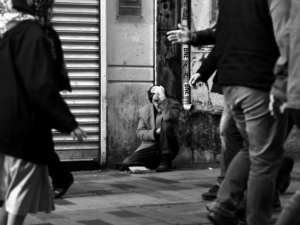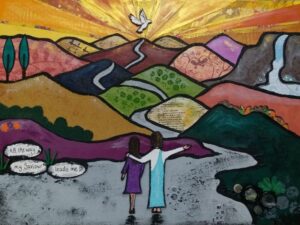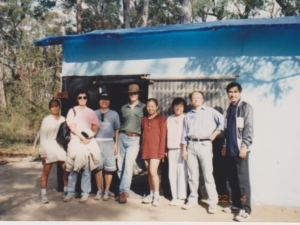
Cross Over to the Other Side
For Christians, the word ‘cross’ symbolises the centrepiece of our faith. However, it is also a verb which denotes an action, a definite and deliberate

Alison lives in the northwest of France with her husband Mike. They have been in France for 35 years working with GLO in church planting and pastoral care. They have recently taken on a role of Member Care with Echoes International. She particularly enjoys getting alongside students and young adults as well as encouraging couples starting off in ministry.
Alison lives in the northwest of France with her husband Mike. They have been in France for 35 years working with GLO in church planting and pastoral care. They have recently taken on a role of Member Care with Echoes International. She particularly enjoys getting alongside students and young adults as well as encouraging couples starting off in ministry.
For Christians, the word ‘cross’ symbolises the centrepiece of our faith. However, it is also a verb which denotes an action, a definite and deliberate movement. From very young we teach children how to cross a road to avoid being run over, we hear of the long and endless flow of refugees attempting to cross borders, fleeing war zones or poverty, and then, in giving directions to a stranger, we can indicate a bridge to cross over a river or similar obstacle. In all these examples, the underlying idea is to pass from one side to the other.
If we apply that concept to people and their position, it will imply a notion of movement towards or away from them.
The parable that Jesus recounts of the Good Samaritan has spoken to me recently. As a man lay dying in the road, three people had the opportunity to provide help and save him. There was, we read, a deliberate action from all three. What struck me was the two religious leaders who crossed over, and passed by on the other side of the road. There was a calculated decision to move away from the needy man. It was the ‘foreigner’ who put differences to one side and saw only a man in distress. The Samaritan crossed the cultural divide, putting aside his own safety and comfort in order to tend the injured man.
The challenge this brings is multifaceted.
Firstly, it would appear there were no witnesses. Each man was travelling alone. Would their reaction have been the same had their congregation been looking on? Do my actions depend on the audience, the onlookers? Of course, we are called upon to be an example to our brothers and sisters in Christ and a witness to the world, but do I act in an identical manner when no one is watching?
Secondly, even the victim ignored who his benefactor was. It is written that the man was left half-dead. He would have been in no state to recognise his ‘guardian angel’ or indeed those who failed to stop. For the latter, they thought that their callousness was unseen, even justified; wasn’t he already unconscious? He wouldn’t last to tell the tale. The Samaritan, however, acted at his own expense with no expectation of reward or even thanks. Am I prepared to cross over to help, even in anonymity?
Thirdly, there was the desire to provide longer term care for the man. Our Samaritan didn’t just drop a penny in the collection box and say bless you. He left extra money so there would be no risk of a relapse due to lacking funds.
As we consider the need to cross over to help others, leave our comfort zone and squash our prejudices, it should not just be a flash in the pan, a good deed to tick off on my list of things to do. Jesus has called us to go to all nations and tell others about God’s act of salvation. One of the ways to do that is, as Jesus illustrates in this parable, Loving your neighbour as yourself. Committing ourselves to others demands stamina and resolve. Taking a conscious and deliberate decision to ‘cross over’, putting aside cultural differences, misunderstandings and preconceived ideas, in order to bring God’s love to those who do not know him yet, is a huge challenge.
Taking a conscious and deliberate decision to ‘cross over’…in order to bring God’s love to those who do not know him yet, is a huge challenge.
Alison Packer Tweet
Do you feel up to it? Do I feel able to do it? We are all too aware of our failings and our weaknesses, but using them as an excuse to cross over to the other side and ignore the need is not an option. If we believe what Jesus is illustrating here is essential to our Christian life and witness, then we must also believe that he will provide the strength and grace to do it.
Wherever we are, we can be sure that we will come across needy people and needy situations. Not necessarily physical needs but emotional and spiritual too. Out of the spotlight and observed only by God, let’s cross over to attend to the needs and not ignore them. Pray for God’s guidance; who do you want me to help today? Who can I share God’s love with and bring glory to Jesus and not myself?

For Christians, the word ‘cross’ symbolises the centrepiece of our faith. However, it is also a verb which denotes an action, a definite and deliberate

“Why not try to paint a picture based on your favourite hymn?” There are many hymns I love, so it’s always hard to choose a

I was raised in a Christian family and was 12 when the Lord called my parents to missionary service. Seeing other countries and cultures was

“You’re not Irish!” he said with a derogatory smile on his face. I was confused, because I thought I was. Some might quip that it

What playlist have you planned to use this summer and what’s it called? Nowadays many of us use playlists on our phones or tablets to

Some words can provoke a reaction. I have sometimes spiced up a conversation with friends by dropping in a word that I know will be

What do you think is the greatest challenge for missionaries? Apparently it’s not necessarily the uncomfortable climate, the unfamiliar diet, the difficulties of language, the

Interesting times we live in! Even if you were alive for the last global pandemic, none of us have experienced anything like this before. The

In this blog, let us think about how our strategies in mission compare with the early church in Acts. Here are two passages from Acts which

Standing one evening with my grandson, who was three years old at the time, we were gazing into the dark night sky. Trying to be

God’s call to us was progressive, slow and measured. Probably, in my case, it started when I was born to missionary parents who came from

Coronavirus: the word on everyone’s lips and the fear in (almost) everyone’s hearts. Response to the pandemic has been mixed. We cannot fail to be

With every job description comes information about the task at hand: what have I to do? Who do I report to? What resources are available

What does it mean to waste life? This is a burning question that all human beings need to face as individuals. Many are wasting the

Being a missionary is not an occupation that many young people would consider these days. When I started as a missionary, there was no salary,

It was toward the end of 1989 when the Lord stopped me in my tracks. For years I had heard the gospel through a Christian

In Acts 8:26-35, we eavesdrop as Philip shares the Message of Jesus with a fellow-traveller. 1) Listening to God (8:26, 29) Philip was a person open

In my first blog I mentioned how important Christian camps have been to us as a family and especially to our two boys Josiah and Joseph.

What should our strategy for mission be?That’s a question many books and articles seek to grapple with. But whilst a lot of these strategies are

These were the remarkable words that Jesus said to his disciples. They’d seen that the crowd who were there to listen to Jesus were in
If you would like to receive information about our next events feel free to sign up to our mailing list.
© Copyright 2019 GLO Europe. All Rights Reserved | GLO-Europe is a charitable Trust based at 78 Muir Street, Motherwell, ML1 1BN.